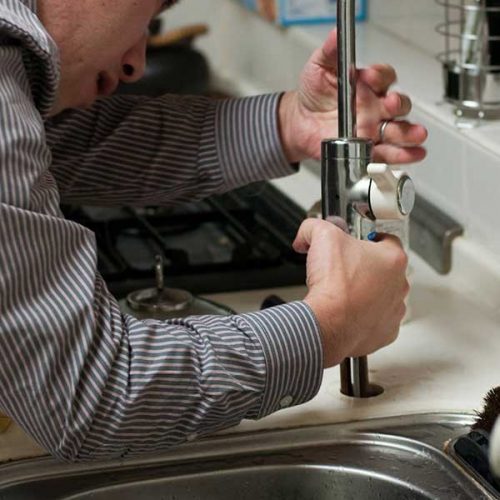The kitchen sink is one of the most used places in our house, whether for washing vegetables and fruits or preparing a recipe. However, it is essential to take the necessary precautions so that you don’t have to come across a clogged sink.
Sink clogging is an extremely unpleasant problem, which makes the routine of the house very difficult and, unfortunately, can happen with high frequency, if not avoided.
Several factors can cause clogging, but the accumulation of fat and food debris is usually the main culprit.
There are different “levels” of clogging, ranging from lighter ones, when the water simply takes a long time to drain, to total ones, when the water does not go down at all, due to completely obstructed pipes.
The good news is that most of these clogs can be prevented with a few everyday habits. With that in mind, we have seven tips for you to avoid a clogged sink in your kitchen. Check out!
1. Have a sink dump:
It is essential to have a sink wastebasket in your kitchen. Remembering that it’s not just food scraps that need to be thrown in it, but all kinds of kitchen garbage. The ideal is to leave the trash right beside or even on top of the sink, to avoid throwing the trash down the drain.
2. Do not pour cooking oil down the Drain:
Cooking oil is a denser substance than water. Therefore, the molecules of this product do not mix with it, and this ends up eliminating the capacity for dilution. So, as the oil is poured into the sink, the chance of clogging increases considerably.
3. Use safety Nets:
Do you know those protection nets that are fitted between the sink and the pipe? Although they appear to be fragile, they are extremely effective in reducing the accumulation of food and objects in the drain.
They manage to prevent materials from overtaking. So, whenever you are handling food, it is essential that it is well positioned inside your sink.
4. Take the coffee filter to the Trash:
That’s because they end up accumulating in the pipes because of the grease that comes out of dirty dishes, and this obstructs the passage of water, leading to clogging of the pipe.
5. Don’t throw food scraps down the Drain:
Many people end up putting dishes with leftovers in the sink. This causes these debris to end up down the pipe and, depending on the type and size of these debris, can lead to clogging. So, the right thing is to remove the rest of the food from the plate, before taking it to the sink.
A tip is to gather all food scraps in a bag, make organic waste and thus take care of your sink. Leave only the dishes you intend to wash on it, completely free of food. Remember that you will take care of your home as well as the environment.
6. Never throw plastic products in the Sink:
Here in this tip, you might be thinking “I obviously know you can’t throw plastic in the kitchen sink”. But, these are the packaging ends of some products (milk cream, milk carton and tomato sauce, for example) that, when they are cut, can end up in the sink pipes.
Know that, if your pipe becomes clogged with these pieces of plastic or inorganic materials, the only way to unclog is with the help of specialized professionals.
7. Create a cleaning routine for Maintenance:
If you don’t want to worry about the health of your sink’s plumbing, do you know that day you set aside to clean your house or apartment and, especially, the kitchen? So, this is the day you should also carefully clean your sink’s plumbing.
And you have a recipe for this: put a cup of salt plus a cup of baking soda in your sink drain. Then, just throw in a kettle of boiling water, smother it with a pot lid or saucer and let it act for ten minutes, more or less.
But be careful! If the pipe is made of plastic, you need to pay extra attention. This is because they can crack on contact with hot water and then cold water.
Finally, it is important to know what can be done, in case the clogging occurs, in fact, in your house and how to properly unclog your sink. The first step is to understand if your sink really is clogged.
For that, there are some very basic measures, even a little obvious, but that can raise doubts, in practice.
Well, if the water isn’t coming down, there’s sure to be a blockage. However, before this happens, you can identify some warning signs, which can be extremely helpful in helping you to avoid a more serious problem.
Check your sink for any of these symptoms below.
If the answer is yes, try to solve the question or count on the specialized help of a plumber:
- Water is flowing more slowly;
- When it’s time to go down into the water, bubbles come out;
- There is noise when going down to the water.
Some useful measures can be taken by anyone, in a mild case of a clogged sink, that is, just starting. Now, when the subject is more complex, only a plunger will be able to solve it. So, if it’s still something superficial:
- Try pouring boiling water into your sink;
- Add vinegar with a little baking soda;
- Use a traditional plunger using suction.
An important tip is to avoid throwing chemicals that are too strong, as this can damage the pipe, causing even more serious problems. Remember, the most viable solution to avoiding a clogged sink is to prevent yourself.
Simple attitudes like the ones we mentioned will make all the difference and free you from the headaches that a clogging can generate.


























